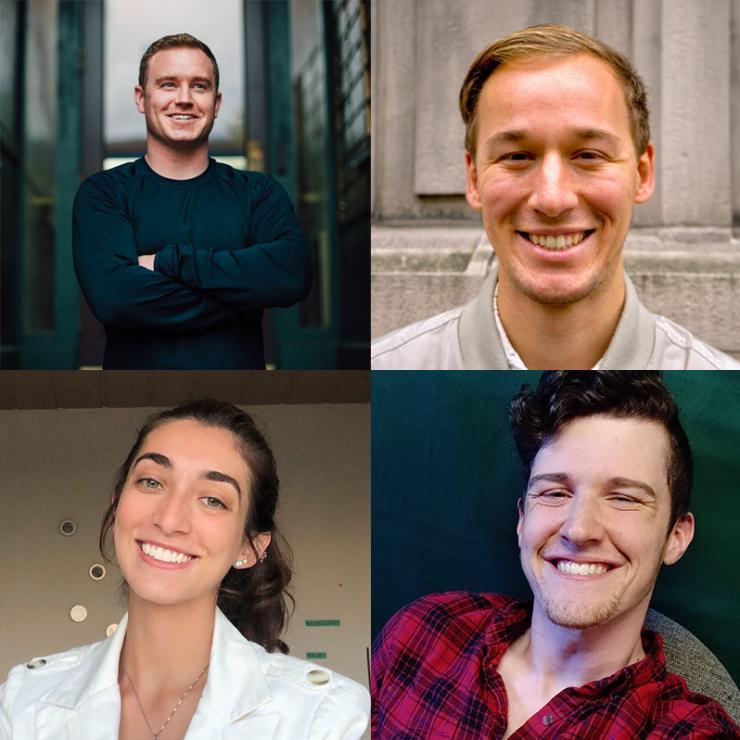Winning Teams Announced at Spring 2021 Convergence Innovation Competition
Jun 03, 2021 — Atlanta, GA

Pictured clockwise from top-left: Robert Stout, Carl Demolder, Daniele Gavetti De Mari, and Phillip M. Kinney.
Two student teams won this year’s Georgia Tech’s 2021 spring semester Convergence Innovation Competition (CIC). As an additional prize, one winning team was also granted a golden ticket to enter Georgia Tech’s Create-X Startup Launch program summer 2021. CREATE-X is a Georgia Tech initiative to instill entrepreneurial confidence in students and empower them to launch successful startups.
The spring 2021 competition was conducted in a completely virtual format with two student teams named winners, and three competitive student teams named as runner ups.
TWO WINNING TEAMS
Team fobbr developed a watchband or bracelet that offers keyless, hands-free access to your work, home, gym, anywhere you need an access card or fob. In today's digitized world, everyone from college students to working professionals need their fobs and access cards everywhere they go. Cities, campuses, and workplaces have started to migrate away from physical keys to digitized cards for building access. Even at Georgia Tech, there is a mixture of access methods: key fobs, physical keys, smart cards, and magnetic card readers. Although digitized keys offer enhanced security, it also provides an additional burden on users. There needs to be a solution that prioritizes the user's experience and ensures seamless interaction with this digitized infrastructure. fobbr is a solution to these problems by offering a hands-free, convenient method for building access. The winning team members are Robert Stout, graduate student in the School of Industrial Design, and Carl Demolder, graduate student in the Woodruff School of Mechanical Engineering.
Team fobbr won a golden ticket to enter the Georgia Tech Create-X Startup Launch program this summer.
Team Neurogram developed an online neuroscience/neurology software that is able to read and share EEG recordings and classify epileptiform discharges, making faster the seizure diagnosis. They combined seizure diagnosis, something that is done by visual inspection, with fast and accurate artificial intelligence technology to decrease the time needed for the patient receive the right treatment and stop seizing. If a seizure lasts more than 30 minutes the risk of death goes from 2.6% to 19%, so there is an urgent need of a fast detection. The diagnosis is still made by a human, but Neurogram can highly decrease the time needed for the doctor to do the diagnosis. The winning team members are Daniele Gavetti De Mari, an undergradaute student studying neuroscience, and Phillip M. Kinney, an undergraduate studying computer science.
THREE RUNNER UP TEAMS
Team Jamiable developed an online support community for musicians. Jamiable is proposed to offer musicians the ability to connect with others online, making profiles to share their interests with friends and writing in public and private forums related to musical, social, and mental health-related discussion. Team members include Jason Smith, Ashvala Vinay, Clara Kennedy, Evan Mi, and Rohit Puntambekar.
Team Nutriful developed an application that make healthy eating easier for its users by accommodating to their culture, preferences, and motivations. Team members include Anunoy Dussa, Neha Deshpande, Saira Poonnen, Zida Wang, and Ziwei Wang.
Team Seedling developed an iOS app for plant owners of all levels that helps organize and monitor the care of your house plants. Team members include Daniella Ruzinov, Ben Melnick, and Joshua McCord.
The Georgia Tech Convergence Innovation Competition (CIC), now in its 14th year, is dedicated to helping students create and showcase innovative and viable products and experiences with the support of campus and industry resources and guidance. CIC categories are determined by community and industry partners and winning entries include a viable end-to-end prototype which operates on converged services, media, networks, and/or platforms.
This year’s convergence areas (competition project focus areas) included the Georgia Tech strategic plan, the United Nations’ sustainable development goals, health and well-being, shaping the human frontier, platforms and services for socio-technical systems, smart cities and inclusive innovation.
Walter Rich
Georgia Tech
Research News




